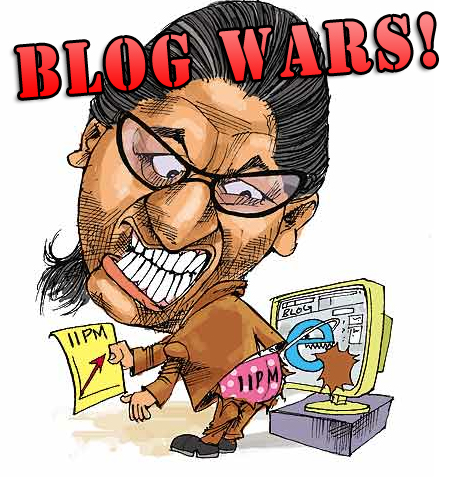#48) The Decline of Civil Discourse in America: From Halberstam to EPIC 2014, “It is what we chose”
June 24th, 2010

IT IS WHAT WE WANTED. IT IS WHAT WE CHOSE (artwork stolen from the apparently defunct desipundit.com)
THE ALPHA AND OMEGA OF AMERICAN MEDIA NOISE
Though I did go to film school, I didn’t study journalism. My education in journalism began with a single life-altering book, David Halberstam’s, “The Powers That Be.” It was the alpha in my journey. I’m beginning to think the omega is the “EPIC 2014″ Flash essay I cited on Monday, which I first viewed in 2006.
In particular, a line from near the end of the EPIC 2014 piece has suddenly really resonated with me. I even quoted it in my last essay. The narrator says, “But EPIC is what we wanted. It is what we chose.”
As we take a short digression, I encourage you to give those two sentences some deep thought. “It is what we wanted. It is what we chose.”
A (relevant, I promise you) DIGRESSION: “I JUST DON’T NEED IT”
Years ago, my German girlfriend (whom I quote in my book) was visiting me in Kansas and we were in a Walmart buying something. In the next lane over, a woman was returning a big, fancy food processor. The clerk asked her why she was returning it. Without hesitating, she replied, “I realized I just don’t need it.” Her comment didn’t even register with me, but to my German friend, it was inspired.
This is the beauty of what a foreigner can bring — an ability to hear things you don’t. She heard that line and grasped the utter simplicity and profundity of it. She looked at me with a smile and repeated the words — “I realized, I just don’t need it.”
Over the years she and I have repeated that line to ourselves. This is what it’s about when people throw off the burdens of our “modern” lifestyles and realize they can live a lot more simply. They look at the trappings of their daily life and say to themselves, “I just don’t need it.” There is sooo much nonsense that they really just don’t need (like fancy food processors instead of a good old-fashioned chopping block and knife), if they would slow down for a moment and think it through.
At any rate, I mention this anecdote because sometimes simple phrases jump out at you, and then, as you begin to see all the complexity in their simplicity, you wonder whether maybe you were just given a glimpse into the simple patterns which, like fractal processes, underlie all the complexity of our lives. Which leads me back to that EPIC 2014 line.
“IT IS WHAT WE WANTED. IT IS WHAT WE CHOSE.”
If David Halberstam were still alive, I think I would try to write to him to tell him about this line. For me, the most powerful and moving sequence in his masterpiece work, “The Powers That Be,” is when he recounts the birth of television in America, it’s rise to idealism, then it’s collapse into mediocrity. He tells about the bold World War II radio correspondents who returned to the U.S., excited to put the new medium of television to work as a force for enrichment and civil betterment. He focused on CBS News in the 1950’s and Edward R. Murrow who embodied what television journalism could be.
But he eventually tells of the decline of television into moronic entertainment like “Gilligan’s Island” and “The Munsters,” that losers like myself were weaned on (Yay!). And how CBS News was stripped down because it simply wasn’t as popular as those shows, leaving Murrow with a depressing end to his once-glorious career (a dimension that George Clooney left out of his heroic portrait of Murrow in his great movie, “Good Night, and Good Luck.”).
And this is where the two EPIC sentences embody Halberstam’s words.
Television. “It was what we wanted. It was what we chose.” Even more relevant is what prefaced those sentences in the EPIC piece. It said, “At it’s best, edited for the most savvy readers, EPIC is a summary of the world, deeper, broader, and more nuanced than anything ever available before. But at it’s worst, and for too many, EPIC is merely a collection of trivia, much of it untrue, all of it narrow, shallow, and sensational.”
Isn’t that EXACTLY what the story is for television? At it’s best, it’s Ken Burns’ The Civil War series on PBS in the early 1990’s which did exactly that — presented a deeper, broader, and more nuanced account of the Civil War than anything previous. But television at it’s worst? Where do we start? “The Jersey Shore”? Shall we assemble a gallery of lowest moments in television history? How’s about we start with Potsie’s musical number on “Happy Days” (the show that coined the term, “jump the shark”), which at least one person chose as the worst moment in the history of television. Though I think some reality shows have dug much deeper than that.
Anyhow, to everyone complaining about the level of noise, chaos, and disharmony in our society today, all that can really be said is, “It is what we chose.” People continue to agonize over “blog wars.” Sorry, but this is what we chose. Just look at blogs as a whole. At their best, they provide information which is deeper, broader, and more nuanced. But at their worst … same, same.